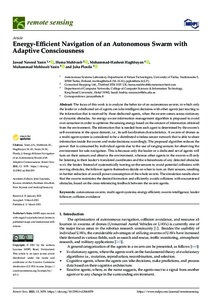Energy-efficient navigation of an autonomous swarm with adaptive consciousness
Yasin Muhammad Mehboob; Mahboob Huma; Haghbayan Mohammad-Hashem; Plosila Juha; Yasin Jawad Naveed
Energy-efficient navigation of an autonomous swarm with adaptive consciousness
Yasin Muhammad Mehboob
Mahboob Huma
Haghbayan Mohammad-Hashem
Plosila Juha
Yasin Jawad Naveed
MDPI AG
Julkaisun pysyvä osoite on:
https://urn.fi/URN:NBN:fi-fe2021093048972
https://urn.fi/URN:NBN:fi-fe2021093048972
Tiivistelmä
The focus of this work is to analyze the behavior of an autonomous swarm, in which only the leader or a dedicated set of agents can take intelligent decisions with other agents just reacting to the information that is received by those dedicated agents, when the swarm comes across stationary or dynamic obstacles. An energy-aware information management algorithm is proposed to avoid over-sensation in order to optimize the sensing energy based on the amount of information obtained from the environment. The information that is needed from each agent is determined by the swarm’s self-awareness in the space domain, i.e., its self-localization characteristics. A swarm of drones as a multi-agent system is considered to be a distributed wireless sensor network that is able to share information inside the swarm and make decisions accordingly. The proposed algorithm reduces the power that is consumed by individual agents due to the use of ranging sensors for observing the environment for safe navigation. This is because only the leader or a dedicated set of agents will turn on their sensors and observe the environment, whereas other agents in the swarm will only be listening to their leader’s translated coordinates and the whereabouts of any detected obstacles w.r.t. the leader. Instead of systematically turning on the sensors to avoid potential collisions with moving obstacles, the follower agents themselves decide on when to turn on their sensors, resulting in further reduction of overall power consumption of the whole swarm. The simulation results show that the swarm maintains the desired formation and efficiently avoids collisions with encountered obstacles, based on the cross-referencing feedback between the swarm agents. View Full-Text
Kokoelmat
- Rinnakkaistallenteet [19218]
